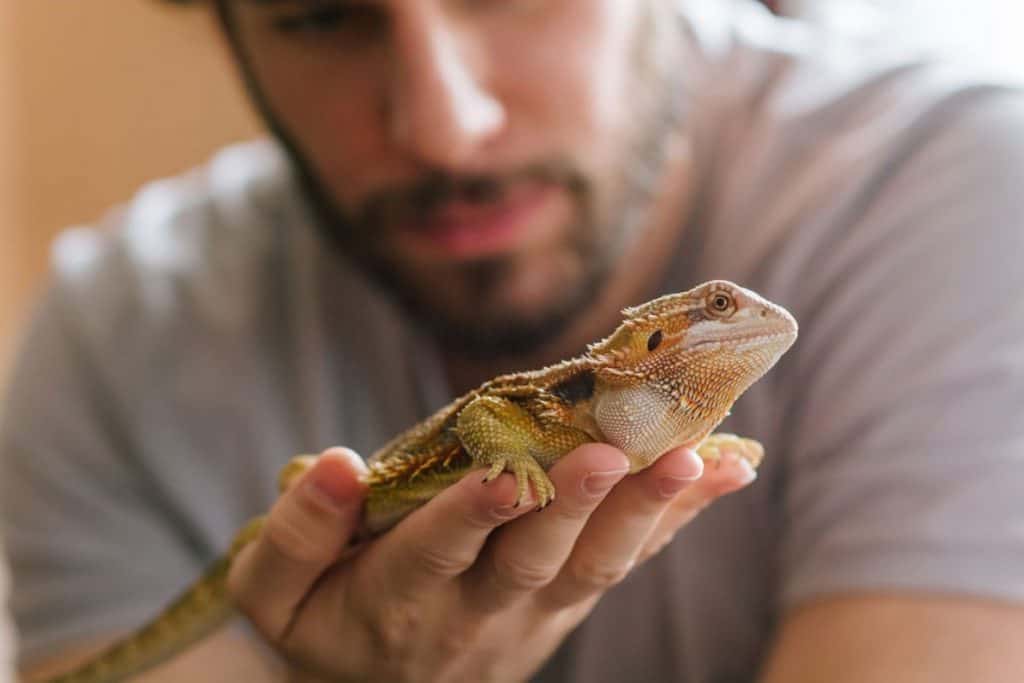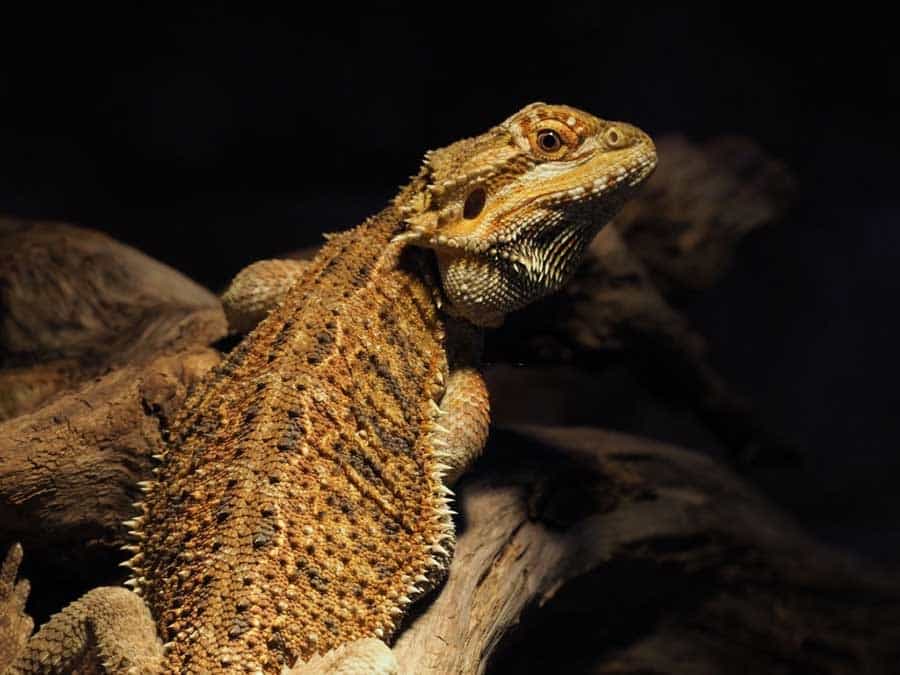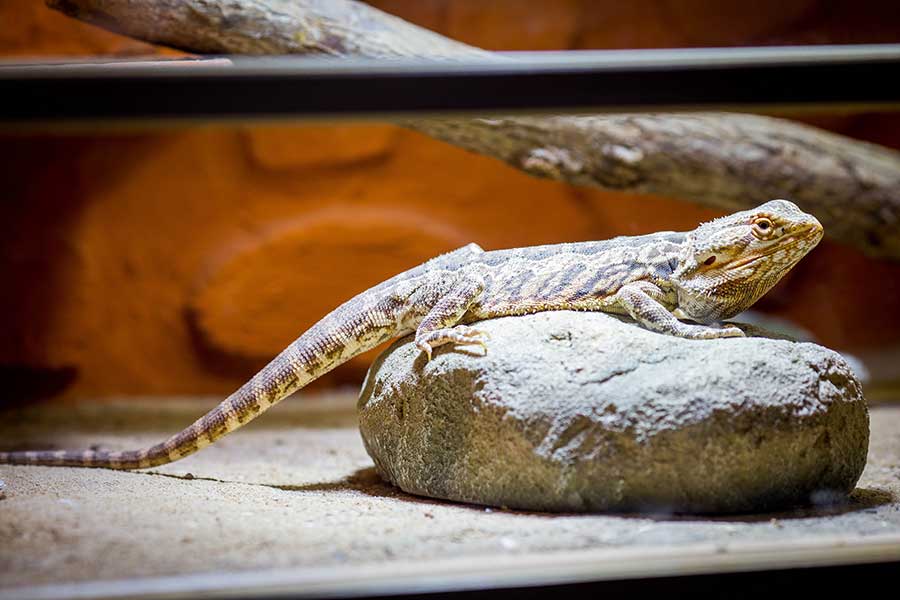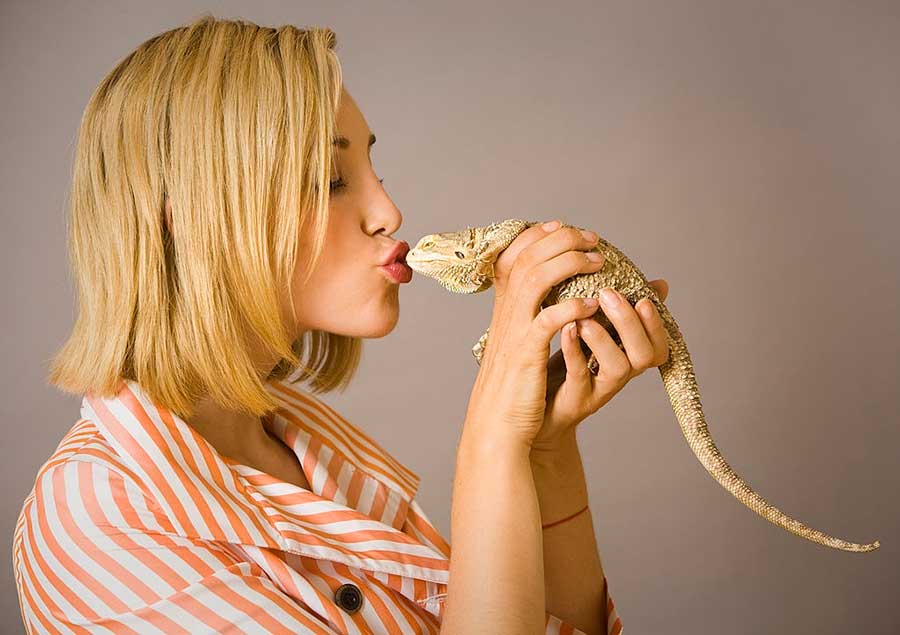Any parent would panic if their child stopped eating, and pet parents are no different. So if your bearded dragon is not eating, your first instinct may be to call the vet. However, a routine vet visit for a bearded dragon can cost $150 before prescriptions and other treatments.
While having a qualified reptile vet on speed dial is useful, you may first want to work through the potential reasons why your bearded dragon isn’t eating. Begin with the basics. These might include:
Read on to learn more about the many possible reasons why your beardie isn’t eating and how to solve them.
Why Is My Bearded Dragon Not Eating? Some Possible Reasons
Just like a parent of human babies, you may blame yourself for why your bearded dragon is not eating. It’s hard not to vilify your scale parenting skills. However, there are tons of reasons why your bearded baby may have lost their appetite, and not all of them are your fault.
A bearded dragon can go anywhere from 3 days to as long as 3 months without eating, but going without food for long periods of time can be stressful and detrimental to their long-term health. Fortunately, there are many ways to improve your lizard’s feeding patterns.
First, run through this list to better understand the potential reasons why your bearded dragon isn’t eating. Once you’ve determined the reason or reasons, you can move on to solving the issue and getting them eating regularly again.
1. Stress
When you bring your bearded dragon home for the first time, they have a lot to get used to in their new habitat, from a new owner, strange sounds and smells, and possibly even a change in time zone. That stress can stop them eating for the first week after you’ve brought them home.
Even after your beardie has lived with you for a while, any sudden changes in their surroundings can still be very stressful. Check their environment for any potential changes that could be stressing them out, and adjust them accordingly if possible.
For example, if you are keeping your beardie in a room with other animals, the presence of other pets could be making them nervous and upset. In this case, it would be best to move your beardie’s enclosure to a room by themselves.
2. Age-Related Issues
Depending on how old your beardie is, their appetite can change. Older bearded dragons will generally eat smaller quantities and less often, while babies and juveniles eat multiple times throughout the day to support their growing bodies.
Baby bearded dragons need to eat several times per day. As they age, they will eat less often, or roughly three or four times a day. Adult beardies will only eat once or twice per day, and senior dragons may only eat every other day. Keep track of your dragon’s age to get an idea of how much they should be eating so any changes won’t take you by surprise.
3. Dietary Boredom
In the wild, bearded dragons are omnivores. They will eat everything from newly-hatched birds to cactus fruit. When you’re keeping a bearded dragon as a pet, your feeding choices are endless. You can offer vegetable salads, sugary fruits, frozen grubs, or live crickets.
If you’re giving your beardie the same kind of food daily, they may get bored and stop eating and just stare into space. Keep their diet varied to keep them interested in their food and give them the wide range of nutrients they need to thrive.
4. Physical Injury
Bearded dragons are playful and social, but they can be a bit clumsy, making them prone to injury if not carefully supervised.
One particularly common wound can be caused by certain substrates like carpet or fabric. Your beardie may get their claws trapped and get hurt. Tile or glass substrates can also put extra strain on your bearded dragon’s limbs and joints. They may crack their claws or damage their legs from low traction.
If your bearded dragon has sustained a physical injury recently, this can affect their appetite and cause them to not want to eat. See a reptile vet immediately if your beardie is injured.
5. Dental Challenges
Yes, bearded dragons need proper dental care. They can develop gingivitis, which can sometimes travel to their bones. They can also develop infectious stomatitis. It’s not a stomach infection – it’s mouth rot. These issues can be caused by feeding your beardie too many sugary fruits, which will quickly cause tooth decay and other issues.
It’s easy to see how painful teeth and raw gums would make your baby refuse their food. If you suspect this is the issue, try to get a good look at your bearded dragon’s teeth and gums for any redness, swelling, or discoloration. Get them to a reptile vet ASAP if anything looks unusual.
6. Internal Parasites
Sometimes, appetite issues can come from the food your dragon is eating. Between loose substrates, a varied diet, and social interaction with other pets, it’s easy for your bearded dragon to accidentally ingest parasites.
Some common parasites that attack bearded dragons include coccidia, pinworms, mites, and ticks. Parasites can cause overeating, but they can kill appetites, too. If you notice any external parasites on your dragon’s body or internal parasites that have been passed in their stool, contact your veterinarian right away to get a proper fecal test.
If your vet has determined the presence of parasites, they’ll need to prescribe oral medications to flush out your beardie’s digestive system or externally applied medications to kill off parasites like mites and ticks.
7. Changes in Their Habitat
Bearded dragons are diurnal lizards, meaning they are typically awake during the day and asleep at night. That’s part of what makes them such popular pets, but it also means they’re creatures of routine.
The slightest change in their schedule can upset your beardie and stress them out. If you’ve recently rearranged the decor in your beardie’s enclosure and they have stopped eating as a result, you may want to readjust things back to the way they were.
8. Feeding Interruptions
Here’s the thing with social pets like bearded dragons – they can be moody, especially when they’re trying to eat. If you touch them, move their food, or distract them in the middle of a meal, they might sulk or become upset and refuse to eat.
This micro-strike could last hours or even days. So, to prevent this from happening, as you feed your scale baby, mist their noses gently with water, offer food, and don’t interrupt them.
9. Social Disruption
Is the reptile room busier than normal? Maybe you have friends hanging out for the day or guests visiting for the holiday. Perhaps you have a new baby or a new pet. A new lizard may threaten your beardie’s sense of security. Even a kitten or puppy can ruffle your bearded baby’s scales. Maybe there’s a new neighbor who keeps tapping the window or playing outside.
Try to keep your bearded dragon’s enclosure in a quiet, secluded room where there are little distractions, particularly during feeding times.
10. Shedding Challenges
Bearded dragons, like most reptiles, shed their skin every so often, with the frequency at which they shed depending mostly on their age. While some reptiles like snakes shed their skin in one neat, clean piece, bearded dragons shed in patchwork, with little pieces falling off gradually until all of the old skin is gone.
Baby bearded dragons shed every two or three days, while adults might only shed once or twice a year. This process is itchy and uncomfortable, so it makes sense that it would affect their appetite from time to time. When they’re actively shedding, your bearded dragon might temporarily lose interest in their food. It’s worse than sunburn!
11. Tank Temperature Issues
Bearded dragons need heat and UVB light to mimic their lives in the wild. Ideally, your beardie’s
If your bearded dragon is hanging out on their basking platform constantly and refusing offers of food, their tank (and their body) may be too cold for them to eat.
12. Tank Humidity Issues
Your bearded dragon’s enclosure needs very specific humidity settings to keep your scaly baby happy and healthy. The ideal humidity setting for a bearded dragon enclosure should be between 30 and 40%. Too high of humidity can cause respiratory infections, while too low humidity can dehydrate your dragon.
Be sure to use a hygrometer in your beardie’s tank to carefully monitor the humidity settings within. If it is too humid or too dry, your bearded dragon’s appetite can be affected.
13. Impaction (aka Reptile Constipation)
Sometimes, your bearded dragon eats something that can’t safely pass through their digestive tract, resulting in impaction.
The most common culprit is poorly chosen loose substrates like sticky sand or large wood chips. These items can build up over time and block your bearded baby’s digestive tract. As a result, they can’t absorb any of the food they’ve previously eaten, and there’s no space in their tummies for more food, in turn reducing their appetite until the blockage is cleared.
Try giving your beardie a warm bath and give them a few drops of olive oil or pureed pumpkin by mouth to encourage a bowel movement. If they still don’t defecate after a few days, contact your reptile vet for further advice.
14. Brumation (aka Reptile Hibernation)
Brumation is essentially the reptile equivalent of hibernation, though it is not quite as long-lasting or intense. Some bearded dragons don’t brumate at all, while others may brumate for months on end, barely eating or moving the entire time.
Depending on where you live, during the cold winter months, your beardie may go into brumation. They’ll hide a lot, sleep during the day, and survive off the fat stores at the base of their tails, so they won’t eat. This is normal; try not to disturb your beardie too much while they brumate, but still offer them food from time to time for when their appetite returns.
15. Side Effects from Medications
If your bearded dragon has recently seen the vet, certain medications they may be prescribed can affect their appetite. Additionally, if they are recovering from an illness, they may already have a decreased appetite.
Give your beardie some time to adjust to the medication and recover. If they still aren’t eating after a few days, call your vet for further instructions.
How to Keep Your Beardie Eating Regularly
Now that you know the many potential reasons why your bearded dragon is not eating and how to solve them, here are some things to keep in mind to ensure your beardie’s appetite stays regular.
1. Identify Potential Stressors Immediately
You may need to play detective and figure out what factors are bothering your bearded baby if their appetite fluctuates again in the future.
Go through the list above and highlight the stressors that could affect your beardie’s appetite. Once you’ve done so, address them accordingly or contact your reptile vet for additional advice. The sooner you identify and address any potential issues, the sooner you can solve them and get your bearded dragon to eat regularly again.
2. Keep a Food Journal
Hopefully, you already have a food journal and a feeding schedule for your bearded dragon, and they’ve probably adjusted to your scheduled feeding times. Keeping a food journal can help you remember and keep track of what your dragon ate and when.
This way, if your beardie stops eating, you can immediately know how long their hunger strike has lasted. It will show you whether their loss of appetite is a chronic problem or just a passing mood. It can also guide you on how to remedy your lizard’s feeding problem and offer hints to why they won’t eat.
Keep a close eye on your food journal to see if your beardie’s appetite has changed recently, and take it with you to the vet. Keep your dragon’s diet interesting by offering a wide range of healthy foods they enjoy.
You can also check your dragon’s growth against a growth chart to make sure they aren’t underweight due to their lack of appetite.
3. Inspect Your Beardie Daily
As you take your lizard out of the tank every morning (and put them back in at night), scan your scale baby’s body for any injuries or irregularities like bruises and cuts. You can caress them gently and whisper to calm them. Pay special attention to their beard, spine, legs, and tails, as these are the most fragile and sensitive parts of their body.
4. Maintain Your Beardie’s Oral Hygiene
Yes, some people brush their bearded dragon’s teeth. You can use a Q-tip dipped in a solution that’s approved by your vet.
You can also feed your bearded dragon crunchy vegetables like carrots and celery to exercise your bearded baby’s jaw and scrape off some of the tartar that can cause infections. Avoid feeding them too many sugary fruits, as these can cause tooth decay.
Calcium supplements also help to keep their teeth healthy.
5. Check Your Beardie’s Poop
If a bearded dragon has internal parasites, the first place you’ll spot them is the poop. It can help to keep a poop journal to complement their food journal.
Take photos if you notice anything unusual like worms or blood. This can help with troubleshooting, and you can show them to the vet if you need to. Regularly checking their stool will help you know what’s normal so you can instantly tell when something is wrong.
6. Bathe Your Beardie Regularly
Shedding can be stressful for your beardie, and you can help them out by giving them a warm bath to loosen the shedding skin. You can also mix a shedding aid into the water.
Zoo Med Reptile Electrolyte Soak – 16 oz
Baby bearded dragons grow quickly, so they may shed several times per month. Adults only shed a few times per year, but if they particularly enjoy their baths, you can soak your beardie once a week or so. It relieves their itchiness and discomfort, and that could be enough to get them eating.
Bathing in warm water can also help soothe impaction or an otherwise upset stomach.
7. Correct Your Tank Temperature
During the day, the hot side of your
Etekcity Infrared
You can use a heat gun to measure the exact temperature of specific spots within the
8. Correct Your Tank Humidity
REPTI ZOO Reptile
Use a hygrometer to monitor and maintain your beardie’s
10. Keep Your Beardie’s Diet Varied
Another great way to keep your bearded dragon interested in their food is to offer them a wide range of insects, greens, other vegetables, and fruits. Don’t stick to one type of food every single day; offer them a salad with a few different foods and rotate them out often.
11. Ask Your Vet About Medication Side Effects
If your bearded dragon has been put on any new medications lately from your vet, be sure to ask about any potential side effects. Some medications can affect your beardie’s appetite long-term.
If your bearded dragon’s existing medications are causing a decrease in appetite, your vet might prescribe probiotics and multivitamins to stimulate your bearded baby’s appetite and counteract that side effect.
FAQs About Bearded Dragon Feeding Habits
You now know the main reasons why your bearded dragon is not eating, and you also have tried and tested ways to solve it. Here are a few other questions you might have.
How much insect protein versus plant material should my bearded dragon be eating?
When they hatch, bearded dragon babies need 60% to 80% insect protein and 20% to 40% plant material in their diets. As they get older, this gradually reverses until they’re eating 20% to 25% insect protein and 75% to 80% plants upon reaching adulthood.
If you give an older dragon too much protein, it can cause impaction or diarrhea, which can cause them to stop eating. Be sure your beardie is getting the proper ratio of insect protein to plant matter according to their age. Don’t forget D3 and
Can pregnancy cause my bearded dragon to stop eating?
If your bearded dragon is female and she’s 10 months or older, then yes, she can develop and lay eggs, even if she hasn’t mated (though the eggs will obviously be infertile).
In bearded dragons and other reptiles, this is called being gravid (as opposed to pregnancy, which mostly refers to mammals). In some cases, gravid bearded dragons can become egg bound, which can cause stress and illness and even be fatal if left untreated.
If her eggs are healthy and fertile, she may eat more to feed her unborn hatchlings. However, if her eggs are bound, the discomfort may stop her from eating. In this case, she’ll need to see a vet as soon as possible.
My bearded dragon doesn’t like fruits and vegetables!
No child likes eating their greens. Not even bearded ones! Thankfully, you can use a few sneaky tricks to get your bearded dragons to eat their veggies.
Bearded dragons prefer hunting live food, so you can use a clean skewer to wiggle the fruits and vegetables. If it moves, it may draw their interest, and they’ll be more likely to eat.
You could also mix in plants with bright natural colors (e.g. bell peppers) to attract their attention or put a small amount of fruits they enjoy in their salads from time to time.
A Final Word on Bearded Dragons Not Eating
In short, change is the main reason why your bearded dragon won’t eat. Something has shifted in their bodies or their environment, whether it’s a parasite, improper tank settings, or even a new (human or animal) sibling.
Do some troubleshooting to find the trigger for their hunger strike. Here are some starting points:
- Confirm the last time they ate.
- Check that the tank conditions are optimal, especially lighting.
- Remove any stressors from the reptile room.
- Try offering a different kind of food.
- If they haven’t eaten or pooped in a week, call the vet.
Additionally, if you haven’t already, look into pet insurance for your beardie. It cuts costs for emergency vet visits and ensures your scale baby can stay happy and healthy without you going broke.





